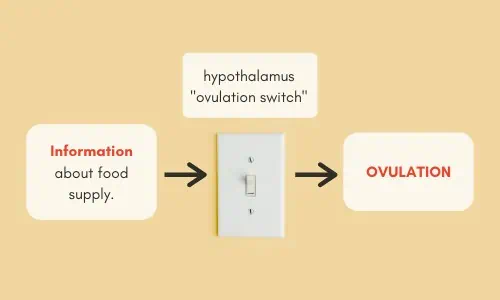
Lost your period? You might just need to eat more. A lot more. Losing your period to undereating is called hypothalamic amenorrhea and is common, especially in women under thirty.
Unfortunately, hypothalamic amenorrhea can sometimes be misdiagnosed as polycystic ovary syndrome (PCOS) because both hypothalamic amenorrhea and PCOS can have “polycystic ovaries” on a pelvic ultrasound exam.
Three signs of undereating and hypothalamic amenorrhea
If the problem is undereating, you likely will have one or more of the following signs:
- no withdrawal bleed from the pill or a progestin-challenge
- low fasting insulin (less than 4 mIU/L or 25 pmol/L)
- low fT3 (thyroid) hormone (less than 2.4 pmol/L)
- a low ratio of luteinizing hormone (LH) compared to follicle-stimulating hormone (FSH) (PCOS has a high ratio).
How undereating stops periods
Too few calories or too little of any macronutrients (including carbohydrates) can switch off the communication between the brain (hypothalamus) and the ovaries. It’s not a malfunction; instead, it’s the brain making the smart decision to actively avoid pregnancy when there is not enough food to make a baby. This situation is also called relative energy deficiency, which is the ratio between energy intake, body mass, and energy expenditure (exercise).
Hypothalamic amenorrhea is like an ovulation “off switch.”

Men do not have a similar “off switch” for their hormones because although the male hypothalamus can dial testosterone up and down, it will never turn testosterone off completely. That’s because the male hypothalamus never has to worry whether it will have access to the 75,000 additional calories it takes to grow a baby.
Ovulation can be switched back on by consuming more food and aiming for a daily intake of at least 2500 total calories and 200 grams of carbohydrates. With increased calories and carbs, ovulation should resume within six months. It takes that long because of the “100 days to ovulation” I describe in Period Repair Manual.
👉 Tip: Hormonal birth control is not an effective treatment for hypothalamic amenorrhea because pill bleeds are not periods.
Ovarian set point
But what about your friend who successfully followed a keto diet and did not lose her period? She is simply calibrated differently. That’s because different women are more or less vulnerable to hypothalamic amenorrhea, depending on their ancestry. According to evolutionary biologist Grazyna Jasienska’s book Fragile Wisdom, different women have different “ovarian set points,” which means different requirements for food energy to ovulate.
Energy is the key to understanding ovarian function. ~ Dr. Grazyna Jasienska
Read: Have you lost your period to a low-carb or keto diet?
Do you have an eating disorder?
If you’re frightened by the idea of eating more, please consider whether you have an eating disorder. Approach it with self-love and self-forgiveness, and know you’re not alone. Eating disorders are common and nothing to be ashamed of.
Reach out for help.
- Office on Women’s Health—Eating Disorders (USA)
- NHS—Eating Disorders (UK)
- National Eating Disorders Collaboration (NEDC) (Australia)
- National Eating Disorder Information Centre (NEDIC) (Canada)
